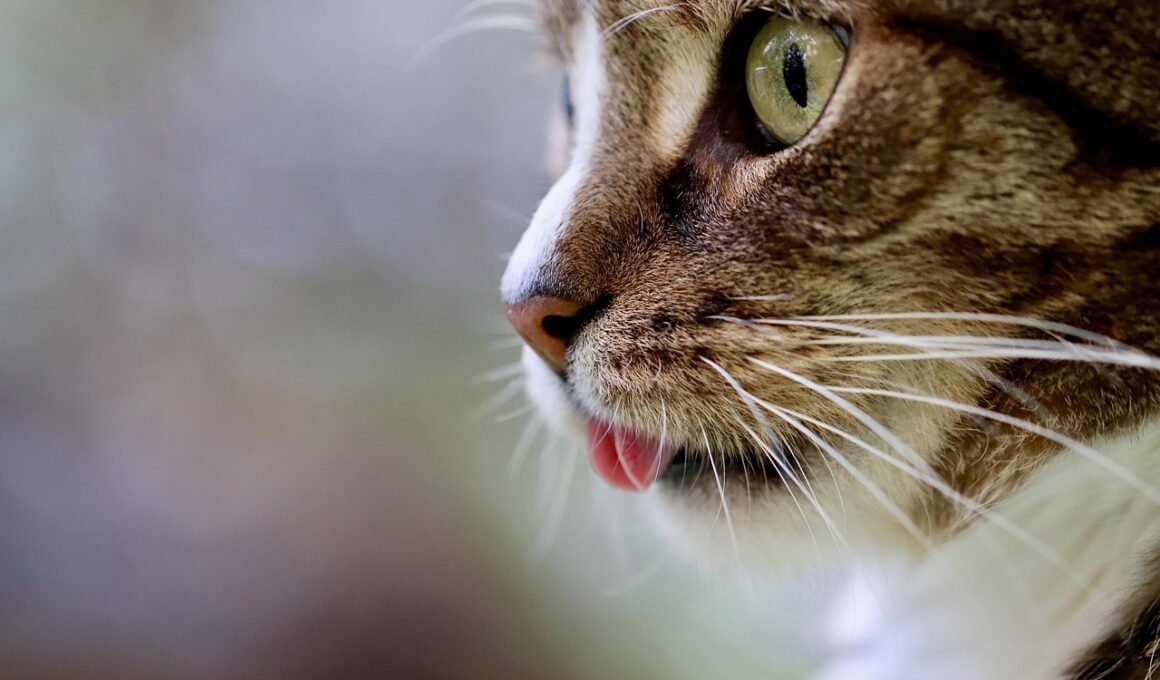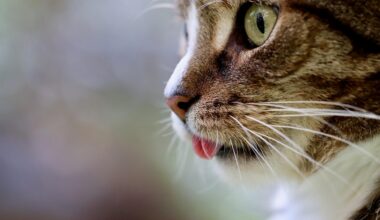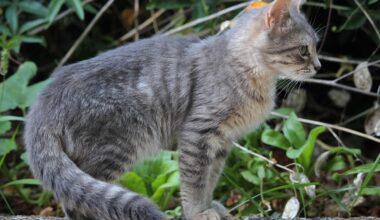Proteins and Kidney Health: What Cat Owners Need to Know
Understanding the importance of proteins in your cat’s diet is essential, especially regarding kidney health. Cats are obligate carnivores, meaning their nutritional needs predominantly derive from protein sources. Proteins are essential for supporting vital body functions, including muscle maintenance, enzyme production, and hormone synthesis. Kidney function is particularly influenced by protein quality and quantity. A high-quality protein source, as found in animal-based foods, provides essential amino acids necessary for your cat. On the other hand, excessive protein can lead to increased nitrogen waste, challenging kidney function, especially in older cats or those with kidney diseases. It’s critical to find a balance between sufficient protein intake to promote optimal health and the risk of overloading the kidneys. Consultation with a veterinarian can help tailor dietary needs. Ultimately, providing your cat with adequate protein while monitoring kidney health requires various considerations. With such knowledge, owners can better understand the dietary requirements of their feline friends. Opting for high-quality protein sources that support overall health while being mindful of renal function is advisable for every responsible cat owner.
Regular veterinary check-ups play a vital role in monitoring your cat’s kidney function and overall health. These assessments help detect early signs of kidney issues, allowing for timely intervention and dietary adjustments. Your veterinarian may recommend blood tests and urine analysis to evaluate kidney health accurately. Early detection can make a significant difference in managing potential problems. If your cat is diagnosed with kidney disease, your vet might suggest a special diet low in phosphorus and protein to alleviate kidney strain. Adjusting protein sources for those with compromised kidney function can help maintain muscle mass while minimizing waste for the kidneys. This tailored approach ensures your cat receives adequate nutrition without burdening the kidneys. Additionally, providing ample hydration is crucial for cats, especially those with kidney problems, as water intake assists in flushing out toxins. Encouraging hydration can be accomplished through wet food diets or ensuring fresh, clean water is always available. Stay informed and proactive in your cat’s health management, and foster a healthy and happy life for your feline friend.
The Role of Amino Acids in Cat Diets
Amino acids are the building blocks of proteins and play a crucial role in your cat’s health. Cats require specific amino acids that they cannot synthesize, such as taurine, arginine, and methionine. Taurine is particularly vital for heart function, vision, and reproductive health. A deficiency in taurine can lead to severe health issues, including heart disease. Meat and animal tissue are robust sources of these essential amino acids. Inadequate protein intake or a diet lacking vital amino acids can compromise your cat’s overall health, including kidney function. The kidneys are essential for filtering waste products from the blood, and without adequate protein, your cat’s body may not perform optimally. Thus, it is crucial for cat owners to select high-quality commercial cat food specifically formulated to meet these amino acid needs. Always read the nutritional information on pet food labels to ensure your cat is receiving a well-balanced diet. By providing well-formulated meals rich in essential amino acids, you can help maintain your cat’s kidney health and overall well-being.
When it comes to choosing the right protein source for your cat, quality takes precedence over quantity. Animal-based proteins usually offer higher biological value than plant-based proteins, which means they provide amino acids that cats can utilize more efficiently for their metabolic needs. When assessing the ingredients in your cat’s food, look for named meat sources such as chicken, turkey, or fish rather than generic terms like ‘meat by-products.’ The protein quality directly influences how your cat’s body processes the nutrients. Opt for high-grade commercial foods that specify their ingredient origins to ensure the optimal protein levels your cat needs for kidney support and overall wellness. Additionally, consider the potential of raw diets, which some proponents claim provide benefits associated with natural feeding. It’s essential to consult your veterinarian before adopting such a diet since raw feeding can pose risks of bacterial contamination. Each cat is unique; therefore, dietary adjustments should be made based on individual health status and lifestyle. Ensure a thorough understanding of nutritional needs for happy cats and healthy kidneys.
Understanding Protein Overload
Protein overload in felines could lead to excessive waste production, and understanding this concept is important for cat owners, particularly those with older pets. Excess protein can burden the kidneys, especially in cats with pre-existing conditions or aging kidneys. Owners should closely monitor their cat’s protein intake to ensure it aligns with health needs and avoids strain. Many commercial cat foods are specifically formulated for various life stages, helping to ensure that feline diets remain appropriate based on life stages and health. Registered veterinary nutritionists emphasize the significance of balanced nutrition tailored to a cat’s life stage. As cats age, they may require dietary adjustments that lower their protein intake without compromising their health. Transitioning to a senior formula cat food can provide the necessary nutrient balance to support aging kidneys. Gradual changes to a cat’s diet are crucial to avoid gastrointestinal upset. Consulting with your veterinarian on dietary modifications is advisable, especially if any health concerns arise. Knowledge about protein requirements can assist you in making informed decisions for your beloved feline companions.
Hydration plays a crucial role in kidney health, especially when balanced with protein consumption. Dehydration can exacerbate kidney issues and lead to further complications. To maintain good kidney function in your cat, it’s essential to promote proper hydration through their diet. Wet food, which contains moisture, is beneficial in ensuring your cat receives adequate water intake, primarily if your cat primarily eats dry kibble. Consider mixing wet and dry foods to encourage hydration. Fresh water should always be accessible, and cats are more likely to drink if their water dish is clean and replenished regularly. Monitor your cat’s drinking habits to ensure they maintain adequate hydration. Poor hydration often leads to urinary concentration and stress on the kidneys. Foods formulated with a balanced ratio of proteins can help maintain hydration while providing essential nutrients. Additionally, consider discussing supplements with your veterinarian that can aid hydration levels. Ensuring your cat’s hydration needs are met will complement their protein intake and contribute to overall kidney health. With these preventive measures, you can enjoy many active and healthy years with your furry family member.
Final Thoughts on Cat Proteins and Health
In conclusion, monitoring protein sources and overall intake is vital in managing a cat’s health, particularly their kidney function. Awareness of your cat’s unique dietary requirements allows you to make informed decisions about their nutrition. The right balance of protein, appropriate hydration, and regular veterinary check-ups supports healthy kidney function in cats for optimal well-being. Cats thrive on high-quality animal proteins, which provide the essential nutrients necessary for maintaining muscle mass and vital organ function, including the kidneys. Conversations with your veterinarian can lead to tailored dietary plans based on your cat’s health. Understanding your cat’s protein needs and how it correlates with kidney health presents an important aspect of responsible pet ownership. Regularly evaluating their diet for the best protein sources while ensuring hydration promotes longevity and health. Stay observant of any signs of kidney distress, such as increased thirst or changes in urination habits. By providing a balanced diet and being proactive about health management, cat owners can ensure their beloved pets lead healthy and fulfilling lives. Invest in their nutrition to build a solid foundation for a long-term partnership.
With the intricate relationship between proteins and kidney health in cats, informed choices significantly impact the longevity and quality of life for feline companions. As awareness of dietary needs increases, so does the importance of making educated decisions when it comes to feeding feline friends. Knowledge about proteins and how they affect kidney health is fundamental for every cat owner. By understanding these dietary nuances, you can be proactive in your cat’s nutritional management. Educating oneself and asking questions about pet nutrition creates a better environment for responsible ownership. Remember to stay updated with the latest research and recommendations regarding feline health and diets, as these can evolve. Every cat is unique, and dietary needs should reflect their individual health status. Finally, don’t hesitate to consult with a veterinarian for personalized recommendations in developing an optimal diet for your beloved pet. Crafting a balanced diet that includes the right protein and hydration will contribute towards the maintenance of kidney health and overall well-being. Through thoughtful and dedicated feeding practices, you will ensure a happy and healthy life for your feline companion.


